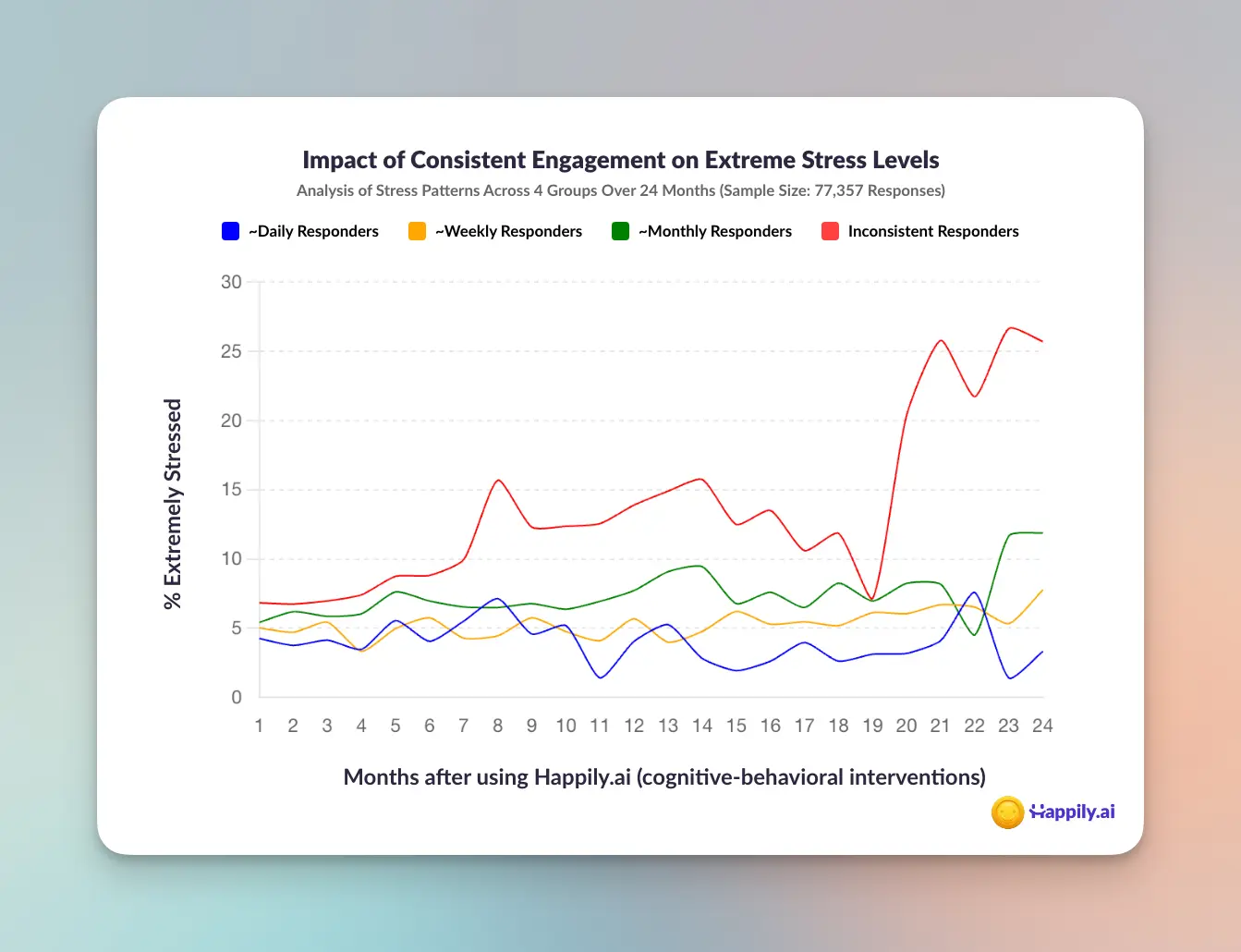Harnessing Consistent Cognitive-Behavioral Approaches to Enhance Team Resilience and Well-being
Workplace stress has emerged as a critical concern for organizations worldwide. As leaders seek effective strategies to maintain employee well-being and productivity, recent research illuminates a powerful approach: consistent cognitive-behavioral interventions (CBIs). This article explores how regular CBIs significantly impact stress management, team resilience, and overall organizational health.
The Cognitive-Behavioral Foundation
Cognitive-behavioral interventions, rooted in evidence-based psychological principles, focus on helping employees identify and modify unhelpful thought patterns and behaviors that contribute to stress and reduced productivity. Research in organizational psychology and behavioral science consistently demonstrates that CBIs are among the most effective tools for managing workplace stress, outperforming other stress management techniques in reducing stress and improving employee well-being.
The Consistency Factor: Daily vs. Irregular Interventions

A comprehensive analysis of stress levels across different engagement patterns with a cognitive-behavioral tool (Happily.ai) over 24 months revealed striking insights:
- Daily to Weekly Engagement: The Power of Consistency
Teams consistently engaging with the CBI tool daily to weekly exhibited the lowest average extreme stress levels, around 4%. More remarkably, the likelihood of multiple team members simultaneously experiencing extreme stress was more than 10 times lower than in teams with irregular engagement patterns.
This dramatic reduction in collective stress experiences is crucial for maintaining team cohesion and productivity. When multiple team members experience extreme stress concurrently, it can trigger a domino effect, negatively impacting team dynamics, communication, and overall performance.
- The Perils of Inconsistent Engagement
In contrast, teams engaging with the CBI tool infrequently or inconsistently saw extreme stress levels rise to nearly 14%, with significant stress spikes that could potentially overwhelm even resilient groups. This underscores the importance of maintaining regular engagement with stress management tools. Sporadic use of CBIs may provide temporary relief but fails to build the long-term resilience necessary to handle ongoing workplace pressures.
- Stability Through Consistency: Reducing Stress Volatility
Perhaps the most compelling finding is the stabilizing effect of regular interventions on stress levels. The variance in extreme stress levels for consistent responders was as low as 2.44, compared to a staggering 38.40 for inconsistent responders.
This stark difference in variance highlights a critical aspect of stress management often overlooked: the importance of reducing stress volatility. While occasional high-stress periods are inevitable, frequent and unpredictable stress spikes can be particularly detrimental to employee well-being and team performance.
By fostering a more stable stress environment through consistent CBIs, organizations create a work atmosphere where employees feel more in control and better equipped to handle challenges as they arise.
The Science Behind Consistent Interventions
The effectiveness of consistent cognitive-behavioral interventions can be explained by several psychological and neurological mechanisms:
- Neuroplasticity and Habit Formation
Regular engagement with CBIs leverages the brain's neuroplasticity – its ability to form new neural connections and adapt to new patterns of thinking and behavior. Studies have shown that consistent mental practices can lead to measurable changes in brain structure, particularly in areas associated with emotional regulation and stress response.
- Cumulative Skill Building
Stress management, like any skill, improves with practice. Consistent engagement with CBIs allows employees to gradually build and refine their stress management toolkit. This cumulative learning process is supported by the principle of spaced repetition, a well-established concept in cognitive psychology that enhances long-term retention and skill development.
- Proactive vs. Reactive Approach
Daily or weekly engagement with CBIs promotes a proactive approach to stress management. Instead of waiting for stress levels to reach a critical point before intervening, consistently using these tools helps employees maintain a baseline of resilience. This proactive stance aligns with the "stress inoculation" concept in psychology, where controlled exposure to stressors builds resilience over time.
- Enhanced Self-Awareness and Early Intervention
Regular engagement with CBIs fosters greater self-awareness among employees. They become more attuned to their stress levels and can identify potential stressors earlier, enabling timely intervention before stress escalates to extreme levels.
Implications for Organizational Leadership
These findings have significant implications for CEOs and HR leaders:
- Integrate CBIs into Daily Work Routines: Seamlessly incorporate cognitive-behavioral interventions into employees' daily work routines through short check-ins, guided mindfulness sessions, or regular team-building exercises focused on stress management.
- Leverage Technology for Consistent Engagement: Utilize digital platforms and apps that provide regular prompts, track engagement, and offer easily accessible CBI resources.
- Monitor and Measure Impact: Regularly assess the impact of consistent CBI engagement on team stress levels, productivity, and overall well-being to refine and improve your organization's approach over time.
Conclusion: Building Resilience Through Consistency
The research clearly demonstrates that consistency is paramount in managing workplace stress. By implementing regular cognitive-behavioral interventions, organizations can significantly reduce extreme stress levels, minimize stress volatility, and foster a more resilient workforce.
The power of daily interventions extends beyond providing stress management tools; it's about creating a culture where positive habits are utilized to build long-term resilience.
For leaders seeking to implement effective stress management strategies, tools like Happily.ai offer a solution aligned with these research findings. As an AI-first toolkit, Happily.ai helps drive top talent retention and team productivity through consistent engagement, recognition, and performance management. By leveraging such innovative platforms, organizations can create a work environment where stress is effectively managed and employee well-being is prioritized daily.
In essence, small, consistent steps in stress management can lead to significant improvements in employee well-being and organizational performance.









